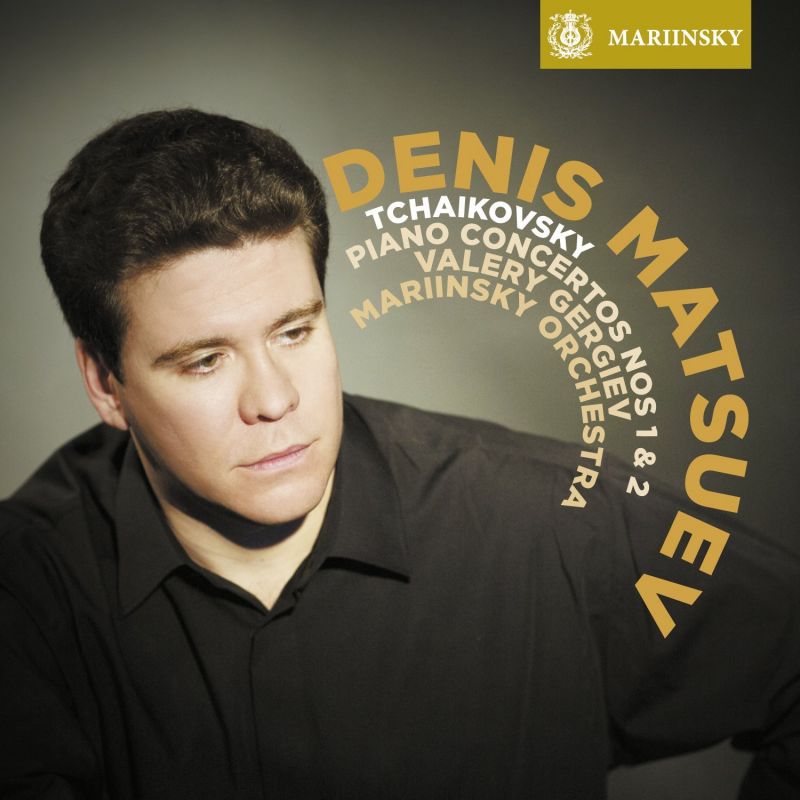TCHAIKOVSKY Piano Concertos Nos 1 & 2
View record and artist detailsRecord and Artist Details
Composer or Director: Pyotr Ilyich Tchaikovsky
Genre:
Orchestral
Label: Mariinsky
Magazine Review Date: 04/2014
Media Format: Super Audio CD
Media Runtime: 78
Mastering:
DDD
Catalogue Number: MAR0548

Tracks:
| Composition | Artist Credit |
|---|---|
| Concerto for Piano and Orchestra No. 1 |
Pyotr Ilyich Tchaikovsky, Composer
Denis Matsuev, Piano Mariinsky Orchestra Pyotr Ilyich Tchaikovsky, Composer Valery Gergiev, Conductor |
| Concerto for Piano and Orchestra No. 2 |
Pyotr Ilyich Tchaikovsky, Composer
Denis Matsuev, Piano Mariinsky Orchestra Pyotr Ilyich Tchaikovsky, Composer Valery Gergiev, Conductor |
Author: Jeremy Nicholas
The B flat minor Concerto has been recorded so many times that you may justifiably ask if we really need another. For an answer, listen to this newcomer. There have been many very great accounts of it – Horowitz / Szell, Argerich / Abbado, Gilels / Mehta among them – but I doubt if you will ever hear it more viscerally thrilling and sumptuously engineered than here. Listening to Matsuev and Gergiev is the aural equivalent of watching Federer and Nadal, friends off the tennis court but ultra-competitive on it, each determined to outdo the other with supreme athleticism and an arsenal of exquisite passing shots.
After a conventional enough introduction, you start to notice deft little touches, such as the weight Matsuev gives to his attack at the top of the keyboard or the darting semiquaver runs at 5'23", which he plays leggiero and with no pedal. Neither protagonist is anxious to linger sentimentally along the way and Gergiev, sometimes routine in concerto recordings, is here fiercely energised – giving as good as he gets, as it were, from his soloist – to the point after the orchestral tutti at 10'55" that you wonder how Matsuev is going to match him. But of course he does, and to hair-raising effect.
In the slow movement, the woodwind-writing and the piano’s sempre staccato passage over the cello solo at 2'02" are beautifully captured. The scherzo, again played with minimum pedal and maximum clarity, almost makes one gasp, Matsuev’s wonderful, gossamer-like touch bringing an unusual playfulness to proceedings. His martellato delivery of some passages throughout this muscular, virile performance sometimes risks going through the tone, and some may find his approach too relentless. Personally, it doesn’t bother me: there is a sense of occasion and a burning purpose here that is missing from so many recordings of this work and which merely adds to the excitement of a conception that builds so inexorably to the work’s peroration that I guarantee, no matter how familiar you are with the concerto, it will make your eyes burn. If this isn’t the greatest performance on disc, it is certainly now my personal benchmark.
Equally impressive readings of both Opp 23 and 44 on a single disc are as rare as hen’s teeth but that’s what we have here, for Matsuev and Gergiev give a similarly blistering account of the G major Concerto. Of other one-disc pairings, Moiseiwitsch and George Weldon (APR, 3/97) are hors de combat sonically and, in Op 44, musically: Siloti’s edition, with its ‘authentic’ rewrites and brutal cuts, so long de rigeur, is thankfully no longer in favour as it was in 1944 (and would remain for many years to come); worst affected is the ‘triple concerto’ second movement, with its extended passages for solo violin and cello reduced by Siloti from 332 bars to 141. Sadly, Cherkassy (DG, 7/99, with two different conductors), in what are otherwise treasurable accounts, also suffers from this cut. On two-disc sets, Gary Graffman and George Szell’s (Sony, 1/06) thrilling first and third movements are compromised by a Siloti second movement; Peter Donohoe and Rudolf Barshai (EMI, 2/91), one of the first recordings to eschew Siloti, is short on adrenaline but features the young Nigel Kennedy and Steven Isserlis; Oleg Marshev and Owain Arwel Hughes (Danacord, A/07) offer Tchaikovsky’s original but are lumbered with two deeply ordinary soloists; Stephen Hough and Osmo Vänskä’s live recording (Hyperion, 5/10) suffers from less than ideal sound and I’m not convinced by Hough’s headlong sprint in the finale after the fermata at bar 483.
So what makes the Matsuev / Gergiev account of the Second Concerto so special? The first movement, with its pages of bravura octaves and physically taxing solo passages, can often sound laborious for the soloist and laboured for the listener. Matsuev revels unapologetically in the display while artfully avoiding mere bombast and providing a nuanced, coherent shape to the whole, not without moments of puckish humour (un poco capriccioso says the score at 8'01") and expressive elegance (11'37"). In the bedevilled Andante non troppo movement I should mention in particular the mellifluous violin and cello soloists (uncredited in the booklet), though the former is a noticeably heavy breather. Tchaikovsky’s sublime melody is played by them heart-on-sleeve, with Matsuev, when he takes up the theme, underlining its elegiac quality with exquisite tenderness. Matsuev and Gergiev opt for the second of the composer’s two versions of the ending, cutting (the redundant, in my opinion) bars 310‑26 and coming in again seven bars before the end. The finale is a riot as it should be and, with scintillating energy, brings to a conclusion this must‑have release. Two five-star recordings, so to speak, on one disc.
Explore the world’s largest classical music catalogue on Apple Music Classical.
Included with an Apple Music subscription. Download now.

Gramophone Digital Club
- Digital Edition
- Digital Archive
- Reviews Database
- Events & Offers
From £9.20 / month
Subscribe
Gramophone Club
- Print Edition
- Digital Edition
- Digital Archive
- Reviews Database
- Events & Offers
From £11.45 / month
Subscribe
If you are a library, university or other organisation that would be interested in an institutional subscription to Gramophone please click here for further information.






